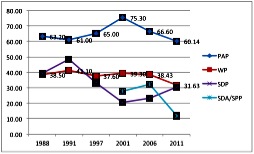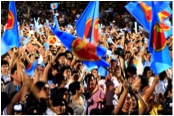Memo #82
Netina Tan – netina.tan [at] utoronto.ca
 On May 7, 2011, 2.06 million Singaporeans cast their votes and returned the People’s Action Party (PAP) to power. Most parties would be happy with the PAP’s 60.1 per cent vote and 81 out of 87 seats. But the result was the party’s worst performance since 1963, a far cry from its 75 per cent vote share during its heydays in the 2001 general election (see Figure 1). Singaporeans were disaffected and voted two cabinet ministers and a candidate slated to be speaker of the House out of office. In an election post-mortem, both minister mentor Lee Kuan Yew and senior minister Goh Chok Tong resigned from the cabinet.
On May 7, 2011, 2.06 million Singaporeans cast their votes and returned the People’s Action Party (PAP) to power. Most parties would be happy with the PAP’s 60.1 per cent vote and 81 out of 87 seats. But the result was the party’s worst performance since 1963, a far cry from its 75 per cent vote share during its heydays in the 2001 general election (see Figure 1). Singaporeans were disaffected and voted two cabinet ministers and a candidate slated to be speaker of the House out of office. In an election post-mortem, both minister mentor Lee Kuan Yew and senior minister Goh Chok Tong resigned from the cabinet.
For this general election, the opposition made a breakthrough, winning a group representative constituency for the first time and boosted its seat shares from 2 (in the 2006 general election) to 6. The opposition remade their image and presented themselves as credible alternatives to the PAP by fielding high-powered professionals, businessmen, and former civil servants with impressive academic credentials.
Electoral Performance of key political parties in constituencies contests (%, 1988-2011GE)Over 9 days of boisterous campaigning, Singaporeans showed no fear as they thronged the opposition rallies by the thousands. As social media tools were allowed for the first time in a general election, the use of Facebook and Twitter galvanized the electorate. Issues such as the rising cost of living, housing prices, immigration policy, investment on casinos, ministerial salaries, insensitive comments about the Malays, and income inequality were openly debated online.
Statistics from online monitoring companies show that for the first 26 days before nomination day, there were already 44,000 blog postings, tweets, and Facebook updates related to the general election. Netizens have turned to social media to question the arrogance of the PAP and rigour of its candidate selection process. During hustings, live tweets and videos of the rallies and results were uploaded faster than the mainstream media. While social media was not a game changer, it led to a rise in social activism and the political awakening of average Singaporeans.
The tide has turned. Internet savvy Singaporeans want a more accountable, open, and responsive government. The PAP has to adapt or risk losing its moral authority to lead in the next general election.
About the Author:
Netina Tan – SSHRC Postdoctoral Fellow, Asian Institute, Munk School of Global Affairs, University of Toronto.
The author would like to acknowledge the Workers’ Party and Straits Times for the use of the photos.
Links:
- Singapore’s tough balancing act on immigration, BBC News, August 2010 (Singapore’s Gini coeffecient, a measure of inequality, rose in 2008)
- GE2011 hot on the Internet, The Straits Times, April 29, 2011
- The impact of new media on GE 2011, Channel News Asia, May 13, 2011
- Fear No More: Singapore’s Defining 2011 General Election, Friedrich Naumann Stiftung, No. 19, May 2011 (by Netina Tan)
- Access to power: hegemonic party rule in Singapore and Taiwan, University of British Columbia, 2010 (by Netina Tan)
Related Memo:
- Our other Memos about Singapore and Southeast Asia


